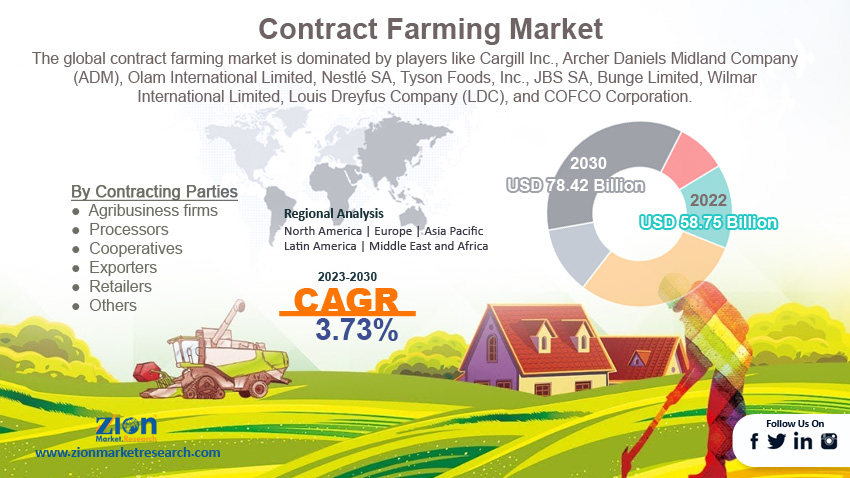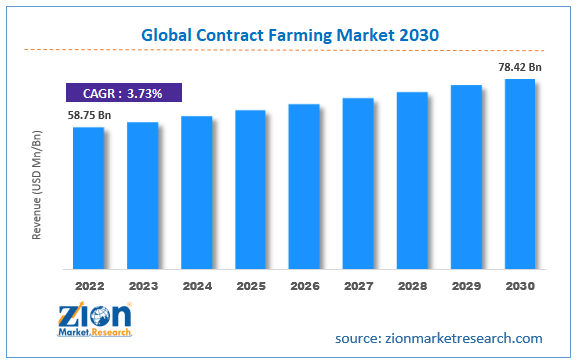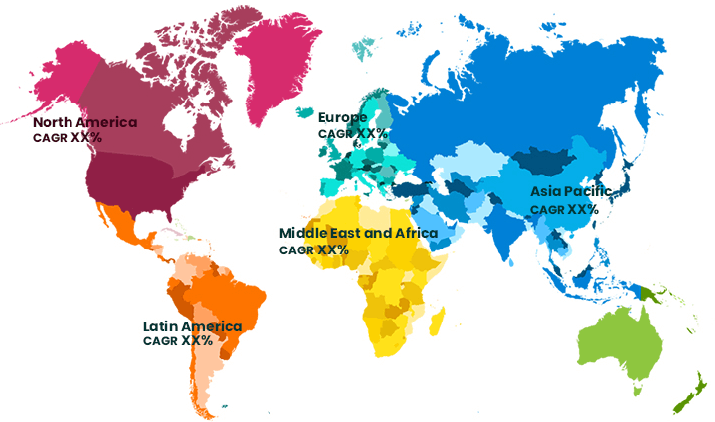Contract Farming Market Size, Share, Growth, Forecast 2030

Contract Farming Market By Crop Type (Cereals, Fruits & Vegetables, Oilseeds, Pulses, Others), By Livestock Type (Poultry, Dairy, Swine, Cattle, Aquaculture, Others), By Contracting Parties (Agribusiness Firms, Processors, Cooperatives, Exporters, Retailers, Others), And By Region - Global, And Regional Industry Overview, Market Intelligence, Comprehensive Analysis, Historical Data, And Forecasts 2023 - 2030
| Market Size in 2022 | Market Forecast in 2030 | CAGR (in %) | Base Year |
|---|---|---|---|
| USD 58.75 Billion | USD 78.42 Billion | 3.73% | 2022 |
Contract Farming Industry Prospective:
The global contract farming market size was worth around $ 58.75 billion in 2022 and is predicted to grow to around $ 78.42 billion by 2030 with a compound annual growth rate (CAGR) of roughly 3.73% between 2023 and 2030.
The report analyzes the global Contract Farming market drivers, restraints/challenges, and the effect they have on the demands during the projection period. In addition, the report explores emerging opportunities in the contract farming industry.
Contract Farming Market: Overview
Contract farming is an agricultural arrangement wherein farmers and agribusiness companies or buyers establish formal agreements to produce and supply specific crops or livestock. This practice aims to create a mutually beneficial partnership between the two parties, whereby the company provides essential resources like seeds, fertilizers, technical guidance, and even financial support to the farmers. Contract farming can offer several advantages, such as reduced production risks for farmers, assured markets for their produce, improved access to modern agricultural practices, and increased income potential. Moreover, it can also raise concerns related to power imbalances, the potential exploitation of farmers, and the need for clear legal frameworks to protect the interests of both parties involved. Furthermore, effective contract farming arrangements depend on equitable terms, transport communication, and effective monitoring mechanisms to ensure sustainability and fairness in the agricultural supply chain.
Key Insights
- As per the analysis shared by our research analyst, the global Contract Farming market is estimated to grow annually at a CAGR of around 3.73% over the forecast period (2023-2030).
- In terms of revenue, the global contract farming market size was valued at around $ 58.75 billion in 2022 and is projected to reach $ 78.42 billion, by 2030.
- Increasing demand for agricultural products and food security is likely to embellish global contract farming market trends. Contract farming plays a vital role in meeting the demand by providing the infrastructure and supplies required for agriculture.
- Based on the crop type, the fruits & vegetables segment is expected to capture the largest revenue share over the forecast period.
- Based on livestock type, the aquaculture segment is expected to capture the largest revenue share over the forecast period.
- Based on the contracting parties, the agribusiness firms’ segment is expected to capture the largest revenue share over the forecast period.
- Based on region, North America is expected to dominate the market during the forecast period.
 Request Free Sample
Request Free Sample
Contract Farming Market: Growth Drivers
Increasing demand for agricultural products and food security is likely to embellish global market trends.
Increasing demand for agricultural products and food security is likely to embellish global contract farming market trends. Contract farming plays a vital role in meeting the demand by providing the required infrastructure for agriculture. Agribusiness enables processors and retailers to provide stable and reliable agricultural products. It encourages farmers to adopt better agricultural practices, including the use of modern technology, efficient crops, and production methods. This leads to enhanced production, ensuring food availability. Second, contract farming often focuses on specific crops or livestock that are in high demand. By signing contracts, farmers are guided by market signals to produce the products they need. For instance, in March 2023, Cargill, a US-based multinational food corporation, acquired Protera, a Canadian agritech company. This acquisition will allow Cargill to expand its portfolio of sustainable protein products. Protera is a leader in the development of plant-based proteins that are made from non-GMO ingredients. The acquisition will give Cargill access to Protera's technology and expertise in developing plant-based proteins, as well as its portfolio of brands, including Puris and SoyaPro.
Another significant growth driver of the contract farming market is the increasing market demand for traceable and high-quality agricultural produce. Consumers are becoming more conscious about the origin, quality, and safety of the food they consume. This trend has prompted agribusiness companies and retailers to seek out reliable sources of produce that can adhere to stringent quality standards and provide traceability throughout the supply chain.
Contract Farming Market: Restraints
Imbalanced Power Dynamics Can Restrict Industry Growth Globally
The restraining factor of the contract farming market is the challenge posed by imbalanced power dynamics. While contract farming can offer several benefits to both farmers and agribusiness companies, it also has the potential to lead to unequal relationships, exploitation, and dependency. Moreover, the lack of transparent and equitable contractual agreements can exacerbate these power imbalances.
Contract Farming Market: Opportunities
Market diversification and crop innovation will open new growth avenues for the global market
Contract farming arrangements can encourage farmers to explore and cultivate a wider variety of crops, responding to evolving consumer preferences and emerging market trends. Agribusiness companies often collaborate with farmers to introduce new crops or varieties that align with changing dietary habits, health considerations, or cultural shifts. This diversification can lead to the production of unique and specialized products that cater to niche markets. By diversifying their crop portfolio, farmers can reduce the risk of relying heavily on a single commodity, mitigating potential losses due to market fluctuations, or crop-specific challenges. Furthermore, contract farming supports the adoption of innovative agricultural practices, including the cultivation of genetically modified or bioengineered crops that offer enhanced nutritional content, pest resistance, or improved shelf life.
Contract Farming Market: Challenges
Market volatility and price fluctuations can prove detrimental to the growth path of the global industry
Market volatility and price fluctuations can prove detrimental to the growth path of the global contract farming industry. It states to changes in agricultural goods due to factors such as government regulations, market fluctuation, weather, international demand, and changes in financial exchange. These volatile prices can create problems for contract farmers, especially when contract terms are inadequate or protect them from business risks.
Contract Farming Market: Segmentation
The global Contract Farming industry is segmented based on crop type, livestock type, contracting parties, and region.
Based on the crop type, the global market is bifurcated into cereals, fruits & vegetables, oilseeds, pulses, and others. The fruits & vegetables segment is expected to capture the largest revenue share during the forecast period. Consumers around the world are increasingly health-conscious and looking for nutritious & tasty options in their diets. This trend has resulted in increased demand for various fruits and vegetables, including exotic and specialty crops. Contract farming provides agribusinesses and retailers a platform to work with farmers to grow a variety of fruits and vegetables to meet specific quality standards and consumer preferences. By entering into formal agreements, these companies can ensure a steady and continuous supply of fresh produce to meet market demand.
Based on the livestock type, the global Contract Farming industry is divided into poultry, dairy, swine, cattle, aquaculture, and others. The aquaculture segment is expected to capture the largest revenue share during the forecast period. The aquaculture sector is increasing focus on sustainable seafood production and the rising demand for seafood products. With the depletion of wild fish stocks and growing environmental concerns, aquaculture is gaining attention as a viable solution to meet global seafood demand while minimizing impacts on natural ecosystems. Contract farming acts as a catalyst for sustainable aquaculture by facilitating collaboration between aquaculture companies and farmers. These agreements promote responsible agricultural practices, efficient use of resources, and adherence to environmental standards.
Based on the contracting parties, the market is segmented into agribusiness firms, processors, cooperatives, exporters, retailers, and others. The agribusiness firms’ segment is expected to capture the largest revenue share during the forecast period. Agribusiness in the context of the contract farming market is the pursuit of enhanced supply chain efficiency and risk mitigation. Agribusiness companies, which encompass various stages of the agricultural value chain from production to distribution, are driven by the need to ensure a consistent and reliable flow of raw materials to meet market demand.
Contract Farming Market: Report Scope
| Report Attributes | Report Details |
|---|---|
| Report Name | Contract Farming Market |
| Market Size in 2022 | USD 58.75 Billion |
| Market Forecast in 2030 | USD 78.42 Billion |
| Growth Rate | CAGR of 3.73% |
| Number of Pages | 229 |
| Key Companies Covered | Cargill Inc., Archer Daniels Midland Company (ADM), Olam International Limited, Nestlé SA, Tyson Foods Inc., JBS SA, Bunge Limited, Wilmar International Limited, Louis Dreyfus Company (LDC), and COFCO Corporation. |
| Segments Covered | By Crop Type, By Livestock Type, By Contracting Parties, and By Region |
| Regions Covered | North America, Europe, Asia Pacific (APAC), Latin America, Middle East, and Africa (MEA) |
| Base Year | 2022 |
| Historical Year | 2017 to 2021 |
| Forecast Year | 2023 - 2030 |
| Customization Scope | Avail customized purchase options to meet your exact research needs. Request For Customization |
Contract Farming Market: Regional Analysis
North America is expected to dominate the market during the forecast period
In North America, the contract farming market is at the forefront of agricultural innovation, driven by advanced technological solutions and evolving consumer preferences. Agribusinesses and farmers are working together to implement precision agriculture, using cutting-edge technologies such as drones, satellite imagery, and data analytics to optimize crop management. These innovations improve productivity, resource efficiency, and sustainability, and meet the growing demand for traceable, high-quality products. As consumers prioritize transparency and environmentally friendly practices, contract farming in North America is emerging as a model for leveraging technology to meet market demands while ensuring that agricultural supply chains are more efficient and responsive.
Europe has a significant contract farming industry; the European market is guided by a commitment to sustainable farming and ensuring food security. Collaboration between agribusiness and farmers focuses on adopting environmentally friendly practices, reducing chemical use, and promoting responsible land & resource management. This growth momentum resonates with consumers who value sustainability and drive ethically manufactured & environmentally friendly products.
Contract Farming Market: Competitive Analysis
The global contract farming market is dominated by players like:
- Cargill Inc.
- Archer Daniels Midland Company (ADM)
- Olam International Limited
- Nestlé SA
- Tyson Foods Inc.
- JBS SA
- Bunge Limited
- Wilmar International Limited
- Louis Dreyfus Company (LDC)
- COFCO Corporation
The global Contract Farming market is segmented as follows:
By Crop Type
- Cereals (e.g., wheat, rice, maize)
- Fruits
- Vegetables
- Oilseeds
- Pulses
- Others
By Livestock Type
- Poultry
- Dairy
- Swine
- Cattle
- Aquaculture
- Others
By Contracting Parties
- Agribusiness firms
- Processors
- Cooperatives
- Exporters
- Retailers
- Others
By Region
- North America
- The U.S.
- Canada
- Europe
- France
- The UK
- Spain
- Germany
- Italy
- Rest of Europe
- Asia Pacific
- China
- Japan
- India
- South Korea
- Southeast Asia
- Rest of Asia Pacific
- Latin America
- Brazil
- Mexico
- Rest of Latin America
- Middle East & Africa
- GCC
- South Africa
- Rest of Middle East & Africa
Table Of Content
Methodology
FrequentlyAsked Questions
Contract farming is an agricultural practice in which farmers enter into an agreement or contract to produce certain crops, pregnant or livestock as predetermined with an agribusiness, cooperative, or system. It is an integrated system that provides a framework for agriculture and marketing, helping to bridge the gap between farmers and buyers.
Increasing demand for agricultural products and food security is likely to embellish global market trends. Contract farming plays a vital role in meeting the demand by providing the infrastructure and infrastructure for agriculture. Agribusiness enables processors and retailers to provide stable and reliable agricultural products.
According to the report, the global contract farming market size was worth around $ 58.75 billion in 2022 and is predicted to grow to around $ 78.42 billion by 2030.
The global contract farming market is expected to grow at a CAGR of 3.73% during the forecast period.
The global contract farming market growth is expected to be driven by North America due to its advanced technological innovations and consumer demand for traceable, high-quality agricultural produce.
The global contract farming market is dominated by players like Cargill Inc., Archer Daniels Midland Company (ADM), Olam International Limited, Nestlé SA, Tyson Foods, Inc., JBS SA, Bunge Limited, Wilmar International Limited, Louis Dreyfus Company (LDC), and COFCO Corporation.
HappyClients
Zion Market Research
Tel: +1 (302) 444-0166
USA/Canada Toll Free No.+1 (855) 465-4651
3rd Floor,
Mrunal Paradise, Opp Maharaja Hotel,
Pimple Gurav, Pune 411061,
Maharashtra, India
Phone No +91 7768 006 007, +91 7768 006 008
US OFFICE NO +1 (302) 444-0166
US/CAN TOLL FREE +1 (855) 465-4651
Email: sales@zionmarketresearch.com
We have secured system to process your transaction.
Our support available to help you 24 hours a day, five days a week.
Monday - Friday: 9AM - 6PM
Saturday - Sunday: Closed







